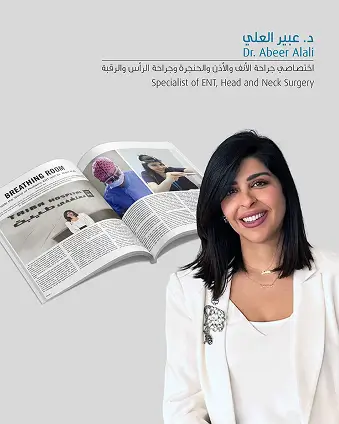
By bazaar staff.
When Dr. Abeer walks into a room, it’s with quiet confidence and a smile that puts even the most anxious parent at ease. A leading ENT (ear, nose and throat) surgeon specializing in pediatric cases, airway surgeries, and congenital ear malformations, Dr. Abeer’s work is delicate, complex, and profoundly life-changing.
But ask her why she chose medicine, and she won’t give you the standard “I wanted to help people” answer.“Honestly, I chose medicine because I thought it was a prestigious field, and I wanted to do something big with my life. I saw it as a smart choice,” she says with a laugh. “But once I started my hospital rotations, I felt the greater purpose of it. I truly fell in love with the work.”
Her journey into ENT was equally unexpected. As a new mom at the time, she knew she wanted to do surgery—but not the “all-hours craziness” of general surgery. A friend suggested ENT. “It’s a surgical specialty but not that crazy,” they said. “So I gave it a shot… and funny enough, it is a bit crazy. But I loved it!” Over time, Dr. Abeer found herself drawn to pediatric ENT, not just for the challenge, but for the opportunity to serve a gap in Kuwait’s medical system. “There were very few doctors doing pediatric ENT. I thought, this is how I can really help my country.” And help, she does. From performing life-saving airway surgeries on newborns to treating congenital ear malformations her days are filled with extraordinary moments.
“There is no doubt—relieving a baby’s suffering and reassuring their parents is the most rewarding thing in the world,” she says. “Helping a baby breathe on their own again after being on a ventilator. Helping a child hear for the first time. Nothing compares.” Some stories stay with her. Not all cases are curable, but even then, Dr. Abeer makes it her mission to be a pillar of support. “I’ve had children with irreversible conditions who will live their lives with breathing or feeding tubes. I can’t fix everything. But I can make sure the parents know they’re not alone. I guide them, reassure them, and let them know they’re getting the same level of care here in Kuwait as they would abroad.”
That deep empathy is grounded in both professional and personal experience. “I’m a mother myself. There are moments when I cry after a case—especially when it’s a child with cancer or a surgery that didn’t go well. But I try to channel that emotion into making things better for the next family. That’s advice my own mother gave me, and I carry it with me every day.”
So how does she recharge after emotionally intense days? “Good question! I’ve completely lost the balance,” she jokes. “But I try to work out when I can, and I surround myself with people I love. Sometimes I just need to pamper myself and feel like everything’s going to be okay.”
Dr. Abeer explains that pediatric ENT is not just about ear infections and tonsil removal—though those are common too. Much of her work involves the airway, from the nose down to the trachea. “Sometimes babies are born with congenital anomalies that make it difficult to breathe. Or they get very sick with infections, end up in the ICU on a ventilator, and then develop scar tissue in the airway. We do everything from simple balloon dilations to major reconstructive surgeries,” she says.
One recent case involved delivering a baby with a neck mass that obstructed the airway. She had to intubate and secure the baby’s breathing before the rest of the body was delivered. “It’s called an EXIT procedure. Very intense, but absolutely life-saving.”
Another big part of her work is cochlear implantation for children born deaf. “Helping them hear—and then watching them thrive in school, make friends, and just live their lives—is amazing.”
When it comes to ear malformations, the spectrum is wide. Severe cases like microtia require multi-step surgeries using rib cartilage, or newer prosthetic solutions. Milder deformities can often be treated non-surgically with EarWell devices—if caught early. “That’s why early diagnosis is so important. A lot of parents don’t know that we can reshape ears with simple, painless techniques if we catch it in the first three months.” Unfortunately, she adds, even mild deformities can lead to serious emotional stress. “I’ve seen children being bullied at school for having ears that ‘look funny.’ I never thought I’d see that in Kuwait, but it happens. Thankfully, we have solutions.”
So what signs should parents be on the lookout for? “Snoring and pauses in breathing during sleep could be signs of obstructive sleep apnea,” she says. “Noisy breathing or frequent choking in newborns might indicate a laryngeal issue. And delayed speech should never be dismissed—it could be a sign of hearing loss or developmental concerns.” Her golden rule? “If something doesn’t feel right, see a doctor. ‘Wait and see’ is a doctor’s call, not the parent’s. As a general rule, if a symptom lasts more than 10 days, get it checked.” She also stresses the basics: healthy diet, good sleep, exercise, and avoiding germ-heavy environments (especially in winter or allergy season). Kids in daycare, for example, are more likely to pick up recurrent infections.
And above all, she encourages parents to listen to their intuition. “Trust your gut. There’s no such thing as a stupid question. If you’re worried, ask.” In a world where medical care can sometimes feel rushed or impersonal, Dr. Abeer’s approach is refreshingly human. She blends surgical skill with maternal instinct, fierce determination with gentle reassurance. In her care, children breathe easier—not just physically, but emotionally too.
You can book an appointment with Dr Abeer Al Ali at Taiba Hospital which is located in Sabah Al Salem, off of route 30 on Road 3. Call them 24 hours at 180 80 88. For updates and information, visit the website taibahospital.com, and follow them on Instagram @taibahospital.